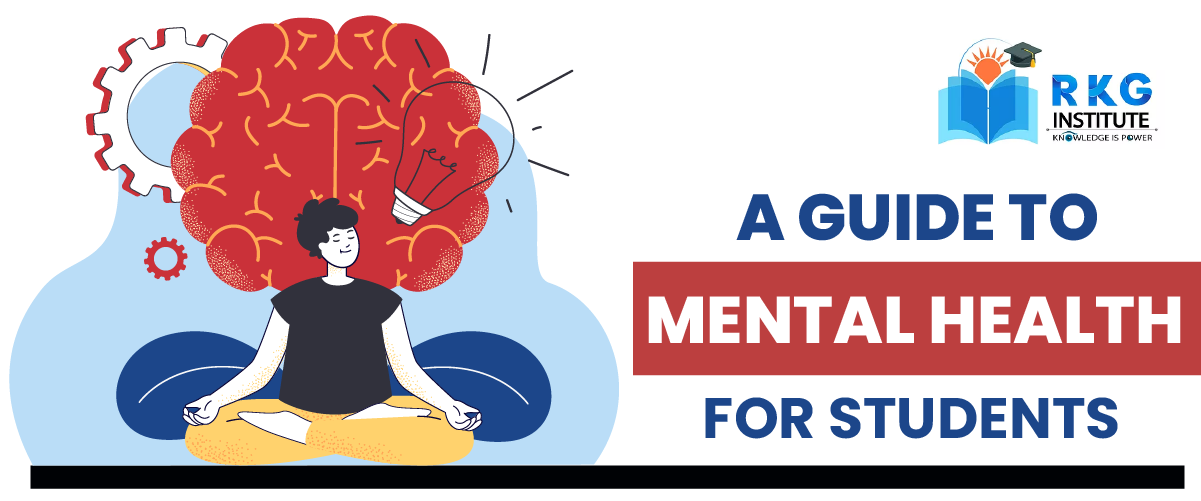“There is no health without mental health.”
– World Health Organisation
In an era when on an average, one student commits a suicide every hour, talks and solutions on mental health problems are extremely required as an immediate agenda. The cases of depression and anxiety has seen a boom among students, and the worst part, very few people actually acknowledge these as serious problems in India. Mental health is equally, or maybe a tat bit more important than physical health of a student and it ought to be taken care of very delicately.
Although there could be many strong factors contributing to the bad mental health of a student, we cannot expect the system to change immediately for us. It is thus advisable for students to start focusing and maintaining a good mental health as young as he can. This blog article will serve the same purpose of educating young students about good and bad mental health, and tips to deal with the same.
Let us first understand the difference between a good and a bad mental health. Refer to the table given below.

| GOOD MENTAL HEALTH 🙂 | BAD MENTAL HEALTH 🙁 |
| Feeling positive about yourself. Traits of optimism. | Feeling very negative or depressed. Traits of pessimism. |
| Generally healthy and happy relations with people around you. | Generally sad or no relations with people around you. Feeling alone. |
| Normally able to cope up with stress and anxiety after a certain period of time. | Not able to face stress and anxiety. You let them own you. |
| Allows you to pursue whatever you want in life. Brings you closer to your goals. | Restrains you from chasing your goals and pulls you apart from them. |
Even a person with good mental health will face tough situations and may get upset and depressed at times. Then how exactly do you differentiate between a good and a bad mental health? The differentiating factor is ‘generality’ of the mental status. If a student is ‘generally’ or ‘ordinarily’ in a good and positive mood, and copes up with difficult times in an understandable period of time, he is said to have a good mental health. If the case is opposite, i.e., the student generally possesses a bad and negative mood and cannot cope up with difficulties, stress and anxiety to a large extent, he is said to have a bad mental health.

What leads to bad mental health of students?
- Stress of examination and huge assignments.
- Living in a negative family environment or friend circle.
- People around him/her not trying to understand his/her problems and emotions.
- Not being encouraged by loved ones.
- Facing and following opposite opinions and directions against his/her will all the time by parents/teachers/friends.
- Being mocked by society for things he/she is not responsible for. Example – body shape, appearance, diseases, etc.
- Experience of some kind of trauma, discrimination, or social disadvantage in childhood, which he/she is not able to forget. Example – death of loved ones at young age, harassment or child abuse, etc.
- Bullying/ragging in schools and colleges.
Tips to maintain a good mental health

- Express
One of the most common things about bad mental condition is not being able to express your feelings or hardships to anyone. This happens to students when they leave their home for the first time, or when they score really bad marks and are not able to catch up with their studies honestly, or when they experience something traumatic.
- Make sure you have at least one pers
- on whom you can share all your problems with, without being judged. It could be your parents, cousins or a close friend. Talk to them whenever you feel low.
- Of course, no person will be available to you 24 × 7. In that case, write down your feelings on a sheet of paper. Yes! This seems very conventional but is very effective.
- Avoid talking to people who make you feel depressed and demotivated.

- 2. Have a good physical health
Your physical health is directly connected to your mental health. The more often you exercise and meditate, the better will be your mental condition. Exercising more often keeps you positive and energetic.
- Exercise at least for 4-5 times a week. Try to exercise early in the morning.
- Meditate for at least 10-15 mins every day.
- Drink at least 8 glasses of water every day.
- Sleep well. Do not sleep for less than 7 hours.
- Involve yourself in any sport you like. Practice it on weekends or whenever you have time and resources to do so.

- 3. Enjoy!
Go out more often. Hang out with your friends once in a week. Afterall, you have got such a good student life. Try exploring new things. Laugh more often. Make the other person laugh. If you don’t want to socialise much, it’s okay. Take yourself out to a long walk at evening. Listen to your favourite songs. Sing with the singer. Dance with the dancers. Enjoy your own company. Create memories.
Identify the things that make you happy temporarily. Do them more often. Keep yourself happy.

- 4. Praise yourself
Talk positive to yourself more often. Praise yourself for every single thing you manage to do correctly, doesn’t matter how small it is. When ever you feel low, take a sheet of paper and write down any 5 moments when you made yourself proud. Read it out loud. Praise yourself again. Tell yourself that you are not weak. Keep reminding your worth to yourself. Build self-confidence.


